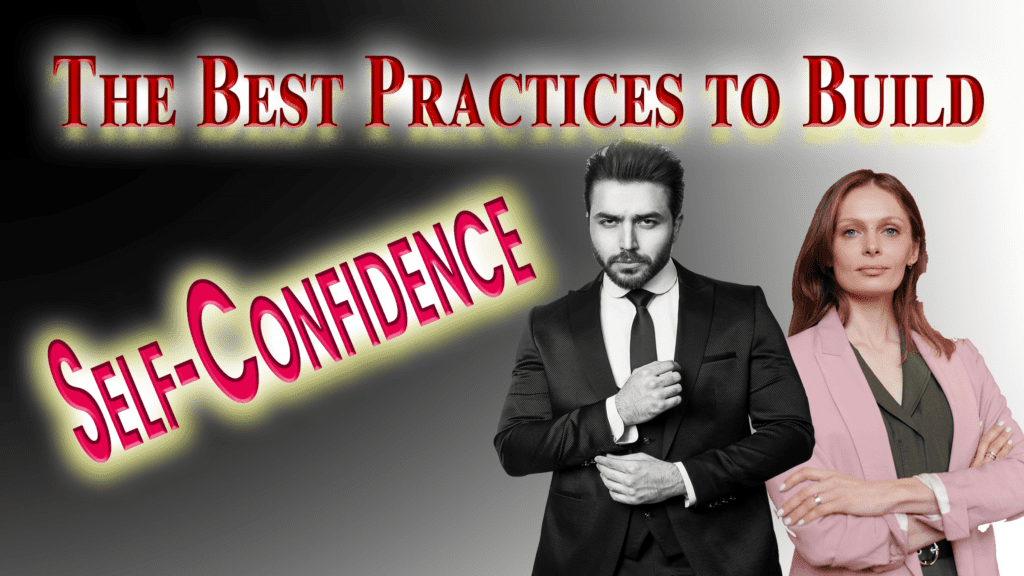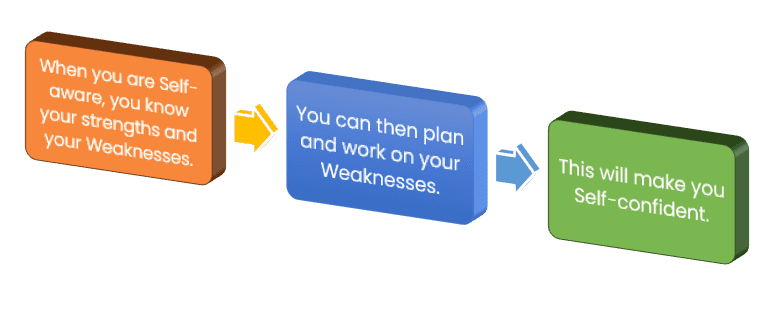
- Qualities of Self-Confident People
- Factors Influencing Self-Confidence
- 1. Self-Awareness
- 2. Past Experiences
- 3. Feedback from Others
- 4. Personal Achievement
- 5. Mindset and Attitude
- 6. Physical Health and Well-Being
- 7. Social Environment
- 8. Education and Skill Development
- 9. Self-Care and Personal Grooming
- 10. Mental Health
- The Role of Physical Factors in Self-Confidence
- The Role of Social Factors in Self-Confidence
- The Importance of Personal Hygiene and Grooming
- Here are some tips for maintaining good hygiene
- Here are some tips for Grooming
- Identifying and Analyzing Your Strengths and Weaknesses
- Additional Tips for Building Self-esteem
- Conclusion
Self-confidence is a fundamental trait that can significantly impact various aspects of your life, from personal relationships to professional success. A self-confident person believes in themselves and their abilities, approaches challenges with positive energy, and stays motivated to achieve their goals. Conversely, lacking confidence can hinder performance, even when you are well-prepared. Let’s explore some effective strategies to build self-dependent and understand the qualities of self-confident individuals.
Qualities of Self-Confident People
Self-confident individuals possess certain qualities that set them apart. These include:
1. Self-Belief
Believing in your abilities and intuition is crucial for personal growth and success. When you have confidence in your skills, you are more likely to take risks and explore new opportunities. Self-belief helps you to:
- Trust Your Decisions: Confidence in your judgment leads to making choices without constant self-doubt.
- Overcome Fear of Failure: Believing in yourself reduces the fear of making mistakes, as you trust your ability to learn and adapt.
- Motivate Yourself: A strong sense of self-belief fuels intrinsic motivation, pushing you to pursue your goals even when faced with obstacles.
2. Hard work
Recognizing the importance of putting in extra effort and dedication is essential for building confidence in achieving your goals. Hard work helps to:
- Develop Competence: Consistent effort leads to skill improvement and expertise, which in turn boosts confidence.
- Achieve Results: The more you work towards your goals, the more likely you are to see positive outcomes, reinforcing your belief in your abilities.
- Build a Strong Work Ethic: A commitment to hard work instills a sense of discipline and perseverance, which are key to long-term success.
3. Positive Attitude
Viewing challenges as learning opportunities rather than obstacles fosters resilience and confidence. A positive attitude allows you to:
- Embrace Challenges: Seeing difficulties as chances to grow helps you tackle them with enthusiasm rather than fear.
- Maintain Optimism: A positive outlook keeps you focused on potential solutions instead of problems, enabling you to stay motivated.
- Recover Quickly: Resilience is built through a positive mindset, allowing you to bounce back from setbacks more effectively.
4. Commitment
Staying committed to your tasks and avoiding excuses enhances your confidence in your capabilities. Commitment helps you to:
- Follow Through: Dedication to your responsibilities ensures that you complete tasks, reinforcing your self-trust.
- Build Reliability: Consistent commitment makes you dependable, which boosts your self-esteem and the confidence others have in you.
- Enhance Focus: Staying committed keeps you aligned with your goals, reducing distractions and excuses that can undermine your efforts.
Factors Influencing Self-Confidence
Several factors can influence your self-confidence,
1. Self-Awareness
Understanding your strengths and weaknesses is crucial. Self-awareness helps you to:
- Acknowledge Your Skills: Recognizing what you are good at builds confidence in those areas.
- Identify Areas for Improvement: Knowing where you need to grow helps you focus your efforts effectively.
2. Past Experiences
Previous successes and failures significantly impact self-confidence. Past experiences influence you by:
- Building a Track Record of Success: Achievements reinforce the belief in your abilities.
- Learning from Failures: Viewing failures as learning experiences rather than setbacks helps maintain confidence.
3. Feedback from Others
Constructive feedback and support from peers, mentors, and loved ones play a crucial role. Feedback impacts you by:
- Providing Validation: Positive reinforcement from others boosts self-esteem.
- Offering Constructive Criticism: Helpful feedback can guide improvement and build confidence in areas of weakness.
4. Personal Achievement
Setting and achieving goals, both big and small, strengthens self-confidence. Personal achievements influence you by:
- Demonstrating Capability: Reaching goals proves to yourself that you are capable.
- Creating Momentum: Successes build on each other, increasing overall confidence over time.
5. Mindset and Attitude
Your outlook on life and challenges greatly affects your confidence. A positive mindset influences you by:
- Encouraging Optimism: Believing in positive outcomes enhances confidence in taking on challenges.
- Promoting Resilience: A growth mindset helps you view obstacles as opportunities to learn and grow.
6. Physical Health and Well-Being
Maintaining good physical health and well-being is fundamental. Physical health affects you by:
- Boosting Energy Levels: Good health provides the energy needed to pursue goals.
- Enhancing Appearance: Feeling good about your physical appearance can improve self-esteem.
7. Social Environment
The environment in which you live and work plays a significant role. Social environment influences you by:
- Providing Support: A supportive network of friends and family fosters confidence.
- Offering Opportunities: Being in an environment that encourages growth and development enhances self-belief.
8. Education and Skill Development
Continuous learning and skill enhancement are vital for building self-confidence. Education and skills influence you by:
- Increasing Competence: Knowledge and skills make you feel more capable.
- Opening Opportunities: Education and skills development create more opportunities for success, which boosts confidence.
9. Self-Care and Personal Grooming
Taking care of yourself and your appearance can have a significant impact on how you feel. Self-care influences you by:
- Improving Self-Esteem: Feeling good about how you present yourself boosts confidence.
- Reducing Stress: Self-care practices reduce stress, allowing you to focus better on your goals.
10. Mental Health
Good mental health is critical for maintaining self-confidence. Mental health affects you by:
- Ensuring Emotional Stability: Good mental health helps manage emotions and reduces anxiety.
- Enhancing Focus: A healthy mind is better able to concentrate on tasks and challenges.
The Role of Physical Factors in Self-Confidence
Physical factors play a significant role in shaping self-confidence. These factors include overall health, appearance, fitness levels, and how you physically feel on a daily basis. Here’s an in-depth look at how physical factors influence self-confidence:
1. Overall Health
a) Energy Levels: Good health translates to higher energy levels, enabling you to tackle daily tasks with vigor and enthusiasm. This increased energy helps you stay productive and accomplish your goals, boosting your confidence in your abilities.
b) Mental Clarity: Physical well-being often correlates with mental clarity. When you’re healthy, your mind is sharper, making it easier to make decisions, solve problems, and handle stress, all of which contribute to self-confidence.
2. Physical Fitness
Strength and Endurance: Regular exercise improves physical strength and endurance. Achieving fitness goals can create a sense of accomplishment and competence, fostering a more confident mindset.
Body Image: Engaging in physical activity and maintaining fitness can lead to a positive body image. Feeling good about your physical appearance can enhance self-esteem and overall confidence.
3. Appearance and Grooming
Self-Presentation: Taking care of your appearance through good grooming habits can significantly impact how you perceive yourself and how others perceive you. Feeling well-groomed and looking your best can boost your self-assurance in social and professional settings.
Self-Esteem: A positive self-image, enhanced by good grooming and dressing well, contributes to higher self-esteem. When you feel good about how you look, it reflects in your behavior and interactions, increasing your confidence.
Building Self esteem:
Here are some practical ways to build self-confidence:
- 1. Think Positively: Replace negative thoughts with positive ones. Analyze setbacks to learn from them and maintain a goal-oriented mindset.
- 2. Celebrate Small Achievements: Recognize and appreciate minor successes, which can provide a sense of accomplishment and boost your self esteem.
- 3. Maintain Personal Hygiene: Staying clean and well-groomed can improve how you perceive yourself and how others perceive you, enhancing it.
- 4. Set Goals: Clearly defined goals give you direction and motivation, helping you work towards achieving them confidently.
4. Nutrition
Healthy Eating: A balanced diet provides essential nutrients that keep your body functioning optimally. Proper nutrition affects mood, energy levels, and cognitive function, all of which play a role in maintaining a confident outlook.
Weight Management: Healthy eating habits help in managing weight, which can influence body image and self-perception. Maintaining a healthy weight through good nutrition supports a positive self-image and confidence.
5. Sleep
Rest and Recovery: Adequate sleep is crucial for physical and mental recovery. Good sleep hygiene ensures you wake up refreshed and ready to face the day, which can enhance your ability to perform tasks effectively and confidently.
Mood Regulation: Quality sleep helps regulate mood and reduce irritability. A well-rested mind is more resilient to stress and better equipped to handle challenges, fostering a confident demeanor.
6. Stress Management
Physical Relaxation: Engaging in activities like yoga, meditation, or deep breathing exercises helps reduce physical tension and stress. Lower stress levels contribute to a calmer, more focused mind, enhancing confidence in your ability to manage various situations.
Resilience: Effective stress management techniques build resilience, allowing you to bounce back from setbacks and maintain a positive, confident attitude.
7. Posture and Body Language
Nonverbal Communication: Your posture and body language communicate confidence to others and to yourself. Standing tall, making eye contact, and using open gestures convey self-assurance and can even help you feel more confident internally.
Physiological Impact: Good posture improves breathing and circulation, which can enhance your overall sense of well-being and confidence.
The Role of Social Factors in Self-Confidence
Social factors significantly influence self-confidence, as humans are inherently social beings who thrive on interactions and relationships. Here’s an in-depth look at how various social factors affect self-confidence:
1. Supportive Relationships
Family and Friends: Having a strong support system of family and friends provides emotional backing and reassurance. Supportive relationships offer encouragement during challenging times and celebrate successes, boosting self-confidence.
Mentors and Role Models: Positive influences from mentors and role models can inspire and guide personal and professional growth. Learning from their experiences and receiving their guidance enhances your confidence in your own abilities.
2. Social Acceptance
Belonging: Feeling accepted and valued in social groups fosters a sense of belonging. This acceptance boosts self-esteem and confidence, as you feel recognized and appreciated by others.
Peer Support: Positive interactions with peers provide a sense of camaraderie and mutual support. Knowing that others share similar experiences and challenges can increase confidence in handling your own situations.
3. Positive Feedback
Constructive Criticism: Constructive feedback helps identify areas for improvement while recognizing strengths. Receiving balanced feedback promotes growth and confidence in your ability to develop and succeed.
Praise and Recognition: Being acknowledged and praised for your achievements reinforces your sense of accomplishment and boosts self-confidence. Recognition from others validates your efforts and abilities.
4. Social Skills and Communication
Effective Communication: Strong social skills, including effective communication, enhance your ability to express yourself clearly and confidently. Being able to articulate thoughts and ideas improves interactions and self-assurance.
Conflict Resolution: The ability to navigate and resolve conflicts positively impacts self-confidence. Handling disagreements and finding solutions demonstrate your capability and resilience in social situations.
5. Community Involvement
Volunteering: Participating in community service and volunteering can boost self-confidence by providing a sense of purpose and fulfillment. Contributing to the well-being of others fosters a positive self-image and a sense of accomplishment.
Group Activities: Engaging in group activities and social clubs builds connections and friendships. These interactions provide opportunities for social growth and increased confidence in social settings.
6. Social Comparison
- Positive Comparisons: Comparing yourself to others can be motivating if done positively. Observing and learning from others’ successes can inspire self-improvement and confidence.
- Avoiding Negative Comparisons: It’s important to avoid negative social comparisons that can undermine self-confidence. Focusing on your own progress and achievements, rather than constantly comparing yourself to others, helps maintain a healthy self-esteem.
7. Cultural and Societal Influences
- Cultural Norms: Cultural norms and societal expectations can shape self-confidence. Understanding and embracing your cultural identity can strengthen self-assurance and a sense of pride.
- Media Representation: Positive representation in media and society can enhance self-confidence, especially for marginalized groups. Seeing diverse and successful role models in various fields promotes a sense of possibility and self-belief.
8. Networking
- Professional Networks: Building professional networks provides opportunities for career advancement and personal growth. Networking helps you gain insights, share experiences, and receive support, all of which boost confidence in your professional abilities.
- Social Networking: Engaging in social networking platforms allows you to connect with like-minded individuals and communities. Positive interactions and feedback from these connections can reinforce self-confidence.
9. Educational Environment
- Supportive Teachers and Peers: A supportive educational environment with encouraging teachers and peers fosters self-confidence in academic abilities. Constructive feedback and recognition in academic settings contribute to a positive self-image.
- Inclusive Learning: An inclusive and diverse learning environment promotes self-confidence by valuing and respecting individual differences. Feeling included and respected enhances self-esteem and confidence.
The Importance of Personal Hygiene and Grooming
1. Personal Hygiene
Personal hygiene is fundamental to maintaining overall health and significantly impacts self-confidence and social interactions. Regular practices such as bathing, brushing teeth, washing hands, and grooming nails not only prevent infections and illnesses but also contribute to a person’s sense of well-being and self-esteem. When individuals maintain good hygiene, they feel fresh and presentable, which enhances their confidence in both personal and professional settings. Moreover, good hygiene practices reflect self-respect and consideration for others, fostering positive impressions and relationships. By prioritizing personal hygiene, individuals can improve their health, boost their self-confidence, and positively influence their social and professional lives.
Personal Grooming
Personal grooming plays a crucial role in enhancing self-confidence by influencing how individuals perceive themselves and how they are perceived by others. Good grooming habits, such as maintaining personal hygiene, dressing appropriately, and ensuring a neat appearance, contribute to a positive self-image. When individuals feel clean, well-dressed, and well-groomed, they are more likely to project confidence and self-assurance in social and professional interactions. This positive self-perception can lead to improved social interactions, increased opportunities, and a greater sense of self-worth. Furthermore, personal grooming reflects self-respect and attention to detail, qualities that are often appreciated and respected by others, thereby reinforcing an individual’s confidence.
Personal hygiene and grooming are crucial for building self. They contribute to a positive self-image and ensure you are perceived well by others.
Here are some tips for maintaining good hygiene
1. Daily Hygiene Practices
- Shower Regularly: Bathe daily to remove dirt, sweat, and bacteria.
- Brush Teeth: Brush your teeth at least twice a day and floss daily to maintain oral health.
- Wash Hands: Wash hands with soap and water before eating, after using the restroom, and when they are dirty.
2. Hair and Nail Care
- Wash Hair: Wash your hair regularly, depending on your hair type, to keep it clean and healthy.
- Trim Nails: Keep fingernails and toenails trimmed and clean to prevent the accumulation of dirt and bacteria.
- Nail Hygiene: Avoid biting nails and use a nail brush to clean under them.
3. Clothing and Footwear
- Wear Clean Clothes: Change and wash clothes regularly to avoid odor and bacteria build-up.
- Foot Hygiene: Wash feet daily, dry them thoroughly, and change socks daily to prevent fungal infections.
- Shoes: Keep shoes clean and dry; avoid wearing the same pair every day to allow them to air out.
4. Skin Care
- Moisturize: Use a moisturizer to keep your skin hydrated and healthy.
- Sun Protection: Apply sunscreen to protect your skin from harmful UV rays.
- Face Hygiene: Wash your face twice daily to remove dirt, oil, and makeup.
5. Personal Items
- Use Deodorant: Apply deodorant or antiperspirant to control body odor.
- Clean Towels and Bedding: Regularly wash towels, bed sheets, and pillowcases to maintain cleanliness.
- Hygiene Products: Replace personal hygiene products like razors and toothbrushes regularly.
6. Diet and Hydration
- Healthy Diet: Eat a balanced diet to support overall health and maintain healthy skin and hair.
- Stay Hydrated: Drink plenty of water to keep your body hydrated and flush out toxins.
7. Regular Check-ups
- Medical Visits: Visit your healthcare provider for regular check-ups to monitor your health.
- Dental Check-ups: Schedule regular dental check-ups and cleanings to maintain oral health.
Here are some tips for Grooming
1. Hair Care
- Regular Washing: Wash your hair regularly using a suitable shampoo and conditioner for your hair type.
- Haircuts: Get regular haircuts to keep your hairstyle neat and well-maintained.
- Styling: Use appropriate hair products to style your hair, but avoid overuse to prevent damage.
2. Skin Care
- Cleansing: Clean your face twice daily to remove dirt, oil, and impurities.
- Moisturizing: Use a suitable moisturizer to keep your skin hydrated and healthy.
- Sun Protection: Apply sunscreen daily to protect your skin from harmful UV rays.
3. Nail Care
- Trimming: Keep fingernails and toenails trimmed and filed to prevent breakage and maintain a neat appearance.
- Cleaning: Clean under your nails regularly to prevent dirt buildup and infection.
- Manicure and Pedicure: Consider regular manicures and pedicures to keep nails in top condition.
4. Oral Hygiene
- Brushing: Brush your teeth at least twice a day to maintain oral health and fresh breath.
- Flossing: Floss daily to remove food particles and plaque between teeth.
- Mouthwash: Use mouthwash to kill bacteria and ensure fresh breath.
5. Shaving and Beard Care
- Regular Shaving: If you shave, do it regularly and use a good-quality razor and shaving cream to avoid irritation.
- Beard Maintenance: If you have a beard, keep it trimmed and well-groomed. Use beard oil or balm to keep it soft and healthy.
6. Body Care
- Shower Daily: Take a shower daily to keep your body clean and odor-free.
- Deodorant: Apply deodorant or antiperspirant to control body odor.
- Lotion: Use body lotion to keep your skin hydrated and smooth.
7. Clothing and Accessories
- Clean Clothes: Wear clean, well-fitting clothes that are appropriate for the occasion.
- Ironing: Iron your clothes to remove wrinkles and look polished.
- Accessories: Choose accessories like belts, watches, and jewelry that complement your outfit without overpowering it.
8. Personal Fragrance
- Perfume/Cologne: Use a subtle amount of perfume or cologne to smell pleasant, but avoid overdoing it.
9. Eyebrow Care
- Trimming and Shaping: Keep your eyebrows trimmed and shaped to suit your face. Consider professional grooming if necessary.
10. Hygiene Essentials
- Clean Towels: Use clean towels and change them regularly.
- Hygiene Products: Ensure personal hygiene products like razors, toothbrushes, and combs are clean and replaced regularly.
Identifying and Analyzing Your Strengths and Weaknesses

1. Strengths
The strength of a person encompasses more than just physical prowess; it includes mental resilience, emotional stability, and moral integrity. A truly strong individual demonstrates the ability to persevere through adversity, maintaining a positive outlook and an unwavering determination to overcome challenges. This strength is often rooted in a deep sense of self-belief and confidence, allowing the person to face life’s difficulties with courage and grace. Additionally, strength can be seen in one’s capacity for empathy, the ability to support and uplift others even when facing their own struggles. True strength is thus a harmonious blend of inner fortitude, compassionate behavior, and the resolve to pursue personal and communal well-being.
2. Weaknesses
Weaknesses are areas where an individual may struggle or lack proficiency, which can impact their personal and professional growth. These vulnerabilities often stem from various factors, including limited skills, lack of experience, or emotional and psychological barriers. Acknowledging weaknesses is crucial, as it provides an opportunity for self-improvement and growth. Recognizing these areas allows individuals to seek support, acquire new skills, and develop strategies to address their challenges. While weaknesses can pose obstacles, they also offer valuable insights into areas where one might benefit from additional focus and effort. Embracing and working on weaknesses can lead to greater self-awareness and resilience, ultimately contributing to a more well-rounded and capable individual.
Understanding your strengths and weaknesses is essential for self-improvement and confidence building. Here’s how to go about it:
- 1. Self-Awareness: Ask yourself fundamental questions about your likes, dislikes, beliefs, and capabilities. Knowing who you are helps in identifying areas of improvement.
- 2. Strengths: These are areas where you excel. Recognizing and leveraging your strengths boosts it.
- 3. Weaknesses: These are areas where you need improvement. Acknowledging and working on your weaknesses helps transform them into strengths.

Additional Tips for Building Self-esteem
To make your journey towards self-esteem even more effective, consider the following tips:
1. Recognize Your Worth
- Begin by acknowledging your intrinsic value as a person. Understand that your worth is not determined by external achievements or opinions but by your inherent qualities and unique contributions to the world.
- Make a habit of affirming your self-worth daily. Write down your positive traits, strengths, and accomplishments, and revisit this list regularly to reinforce a positive self-image.
2. Set Realistic Goals
- Establish clear, attainable goals that align with your values and interests. Break these goals into smaller, manageable tasks to avoid feeling overwhelmed.Celebrate each step you complete towards your goals.
- Recognizing small achievements builds confidence and reinforces your capability to succeed.
3. Practice Self-Compassion
- Treat yourself with the same kindness and understanding you would offer a friend. Accept that everyone makes mistakes and that these experiences are opportunities for growth.
- When faced with setbacks, avoid self-criticism. Instead, practice self-compassion by acknowledging your feelings, understanding their origin, and encouraging yourself to move forward positively.
4. Develop Positive Relationships
- Surround yourself with supportive, encouraging people who uplift and inspire you. Healthy relationships can significantly enhance your self-esteem by providing a sense of belonging and acceptance.
- Limit interactions with individuals who are consistently negative or critical. Their influence can undermine your self-confidence and hinder your personal growth.

5. Engage in Self-Care
- Prioritize activities that nurture your physical, emotional, and mental well-being. Regular exercise, balanced nutrition, adequate sleep, and relaxation techniques like meditation or hobbies contribute to overall self-esteem.
- Make time for activities you enjoy and that bring you joy. Doing things that make you happy reinforces your sense of self-worth and fulfillment.
6. Challenge Negative Thoughts
- Become aware of negative self-talk and actively challenge these thoughts. Replace them with positive affirmations and realistic perspectives that reflect your true capabilities and strengths.
- Cognitive-behavioral techniques, such as journaling your thoughts and reframing them positively, can be effective in shifting your mindset towards a healthier self-view.
7. Acquire New Skills
- Learning new skills or pursuing new interests can boost your confidence and expand your sense of competence. This can include hobbies, professional development, or academic pursuits.
- Set aside time regularly to engage in activities that challenge you and promote personal growth. The satisfaction of mastering new skills contributes to a stronger self-image.
8. Seek Constructive Feedback
- Welcome constructive feedback from trusted sources as a tool for growth and improvement. View feedback as an opportunity to enhance your skills and performance rather than a personal critique.
- Use feedback to set specific, actionable goals for self-improvement. A proactive approach to feedback can boost your confidence and motivation.
9. Focus on Your Strengths
- Identify and focus on your strengths rather than dwelling on perceived weaknesses. This shift in focus can help build a positive self-image and reinforce your capabilities.
- Regularly remind yourself of past successes and how your strengths contributed to these outcomes. This practice can motivate you to leverage your strengths in future endeavors.
10. Contribute to Others
- Engage in acts of kindness and volunteer work. Helping others can provide a sense of purpose and fulfillment, which in turn can boost your self-esteem.Recognize the positive impact of your contributions on others.
- Understanding that you make a difference can enhance your self-worth and reinforce your value to the community.
Conclusion
Building self-confidence is a continuous process that involves self-awareness, positive thinking, goal setting, and maintaining good hygiene and grooming. By understanding and leveraging your strengths, acknowledging and improving your weaknesses, and following the additional tips provided, you can enhance your self-inner and lead a more fulfilling life. Remember, self-esteem or self inner is not about being perfect; it’s about believing in yourself and your abilities, embracing challenges, and learning from experiences.
1. What is self-confidence?
Self-confidence is the belief in one’s abilities and judgment. It involves having a positive yet realistic view of oneself and one’s abilities.
2. Why is it important?
Self-confidence impacts many aspects of life, including:
Improved mental health
Better relationships
Increased resilience
Higher motivation and productivity
Greater willingness to take risks and try new things
3. How can I improve my self-confidence?
Here are several strategies to boost self-confidence:
i) Set and Achieve Small Goals: Start with small, manageable tasks and gradually take on bigger challenges.
ii) Positive Self-Talk: Replace negative thoughts with positive affirmations.
iii) Learn New Skills: Expanding your skill set can boost your confidence.
iv) Physical Activity: Regular exercise can improve mood and reduce anxiety.
v) Grooming and Self-Care: Taking care of your appearance can enhance self-esteem.
vi) Seek Support: Surround yourself with supportive and positive people.
vii) Face Your Fears: Gradually expose yourself to things that scare you to build resilience.
4. What are some signs of low self-confidence?
i) Self-doubt and negative self-talk
ii) Avoiding challenges or new experiences
iii) Excessive worry about others’ opinions
iv) Difficulty accepting compliments
v) Fear of failure
5. What is grooming?
Good grooming can:
i) Enhance self-confidence
ii) Create a positive first impression
iii) Improve personal and professional relationships
iv) Reflect respect for oneself and others
6. What are basic grooming tips for daily life?
Skincare: Cleanse, moisturize, and protect your skin with sunscreen.
Haircare: Keep your hair clean and styled according to your preference.
Oral Hygiene: Brush and floss your teeth twice a day.
Nail Care: Keep nails trimmed and clean.
Dress Appropriately: Wear clean and suitable clothing for the occasion.
Personal Hygiene: Bathe regularly and use deodorant.

